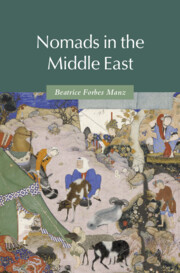Book contents
- Nomads in the Middle East
- Series page
- Nomads in the Middle East
- Copyright page
- Dedication
- Additional material
- Contents
- Figures and Maps
- Preface
- Maps
- Debate between Sheep and Grain
- 1 Introduction
- 2 Nomads in the Establishment of the Caliphate
- 3 The Rise of New Peoples and Dynasties
- 4 Turkic Tradition and Seljuqid Rule
- 5 Mongol Conquest and Rule
- 6 After the Mongols: Timurids, Turkmen and Ottomans
- 7 The Rise of Nomad Tribes,1500–1800
- 8 Nomads in the Modern Middle East
- 9 Conclusion
- Bibliography
- Index
9 - Conclusion
Published online by Cambridge University Press: 12 November 2021
- Nomads in the Middle East
- Series page
- Nomads in the Middle East
- Copyright page
- Dedication
- Additional material
- Contents
- Figures and Maps
- Preface
- Maps
- Debate between Sheep and Grain
- 1 Introduction
- 2 Nomads in the Establishment of the Caliphate
- 3 The Rise of New Peoples and Dynasties
- 4 Turkic Tradition and Seljuqid Rule
- 5 Mongol Conquest and Rule
- 6 After the Mongols: Timurids, Turkmen and Ottomans
- 7 The Rise of Nomad Tribes,1500–1800
- 8 Nomads in the Modern Middle East
- 9 Conclusion
- Bibliography
- Index
Summary
The Middle East was built on two complementary economies: agriculture and pastoralism. Given the dry climate and difficult terrain, the region could probably not have developed a rich urban civilization without pastoral nomadism. Nomads made it possible to cross deserts; provided animal produce for cities and trade; guidance, protection and livestock for caravans; and both horses and soldiers for war. They also contributed to state-building. States founded by the Bedouin were usually small regional polities, often in regions bordered by states competing for power, such as the Roman and Sassanian Empires or the Abbasid and Fatimid Caliphates. The steppe nomads had a more stratified social structure and their own imperial ideology; the Seljuqs, Mongol, and Timurids founded larger states with imperial pretentions. From the fifteenth century on conquests came from within, largely from the nomadic tribes of Anatolia and Transoxiana. The decline of nomads after the early 19th century was due partly to new weaponry and growing state power, but also to the transport revolution and the decline of the market for livestock. Nomads ceased to be necessary for war, trade and border protection but survive as providers of livestock products.
- Type
- Chapter
- Information
- Nomads in the Middle East , pp. 231 - 241Publisher: Cambridge University PressPrint publication year: 2021

